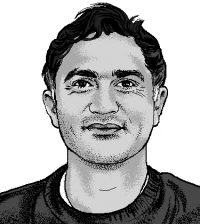On the holiness of casseroles and spreadsheets
When our church offered Rosa sanctuary, our ordinary habits became a politics of hospitality.

At the end of the Bible, in the last chapters of the book of Revelation, we read a vision of hope for the church and the world. Jerusalem, the holy city of God, descends into our world. The multitudes gather in the heavenly city, now on earth, and in their gathering is the very presence of God: “see, the home of God is among mortals” (Rev. 21:3).
The promise of this vision is that God’s life descends here, into our earthly community—into the plainness of church work, the basic routines of gathering for fellowship and worship, the hand of God in the care we offer each other and our neighbors. Our life and labor are a kind of homemaking with God.
Read our latest issue or browse back issues.
I try to remind myself of the holiness of this vision when I’m immersed in the daily toil of emails, spreadsheets, calendars, and committee meetings. While none of these crossed my mind when I first heeded the pastoral call, I’ve become an expert with the tools needed for organizational logistics.
Church life has everything to do with the body of Christ assembled for worship and fellowship, for mutual care and public service—to receive and proclaim God’s love for the world. All of this involves the design of online signup sheets and the mobilization of volunteers, the development of agendas for meetings and the delegation of responsibilities to committees. Pastoral ministry, I’ve learned, resembles the work of my friends who are grassroots community organizers, with our spreadsheets and running notes and one-on-one relational meetings—all of the strategies in the tool kit for organizing a people, for gathering a community in the presence of God.
Church displays a political life: a congregation is like a polis, a city, as my seminary professor Stanley Hauerwas has put it. And pastors, I’d add, are like community organizers. That’s how I characterized my work in a 2012 Century interview about the early years of ministry. “Our little church assembles as a polis,” I said, “and I work behind the scenes to make sure everything is ready for the meeting."
I’ve never understood why ministry pundits like to oppose mission with maintenance and movement to institution. A community doesn’t gather—whether for worship or for a public demonstration—without organizers. Someone sends an announcement; someone maintains a list; someone keeps track of past successes and failures. Collective movements are indebted to the perseverance of institutional forms and cultural memories. Pastors do the basic work of issuing reminders about where a community has experienced God to have shown up in the past and making sure all the preparations have been made for when God shows up again.
During the Trump presidency, as his administration ramped up Immigration and Customs Enforcement’s power to arrest and deport, my congregation’s institutional structure and organizational habits prepared us to welcome an undocumented resident into protective ecclesial sanctuary. We took our cues from the 1980s sanctuary movement, when hundreds of congregations harbored Central American refugees in defiance of US laws. Government officials prefer not to make public relations nightmares for themselves by trespassing onto church property in order to conduct state-sponsored kidnapping operations, and ICE agents were instructed not to venture into religious communities.
So we coordinated the efforts of skilled church members to convert an office into a bedroom and a closet into a bathroom with shower. Since our new resident couldn’t leave church property without fearing capture and deportation to El Salvador, a world away from her children and life here in North Carolina, people from several congregations in the area signed up for weekly grocery store runs, meal delivery, and laundry service. We scheduled 24-hour accompaniment, with shifts of trained volunteers ready to respond with nonviolent resistance if ICE agents threatened to enter the building.
During the years when Rosa del Carmen lived in sanctuary on church property, the ordinary habits of congregational life became a politics of hospitality in opposition to the ethno-nationalist policies of President Trump. When I added volunteers to the meal schedule, I would remind them that to drop off dinner for her was to risk participation in a prosecutable offense—a casserole as an act of civil disobedience. The mundane structures of care at the heart of our community were in contrast to the nation-state’s politics of exclusion, of deportation. We organized our polis according to the hospitality of the gospel, not according to the government’s categories of citizen and alien—a division that renders some people deportable in order to protect the rights and privileges of others.
With our spreadsheets and casseroles, we maintained our witness to God’s peace and wholeness in the face of the violence of deportation—the government’s attempt to tear Rosa from her children, to rip her life from the fabric of our society, all for the sake of citizenship, the policed sectarianism of the global order. The institutional life of the church made possible our alternative politics, which has been our homemaking with God: our labor as a collective prayer for a heavenly city to descend into our midst, for God’s life to dwell among us mortals.
A version of this article appears in the print edition under the title “Spreadsheets and casseroles."







